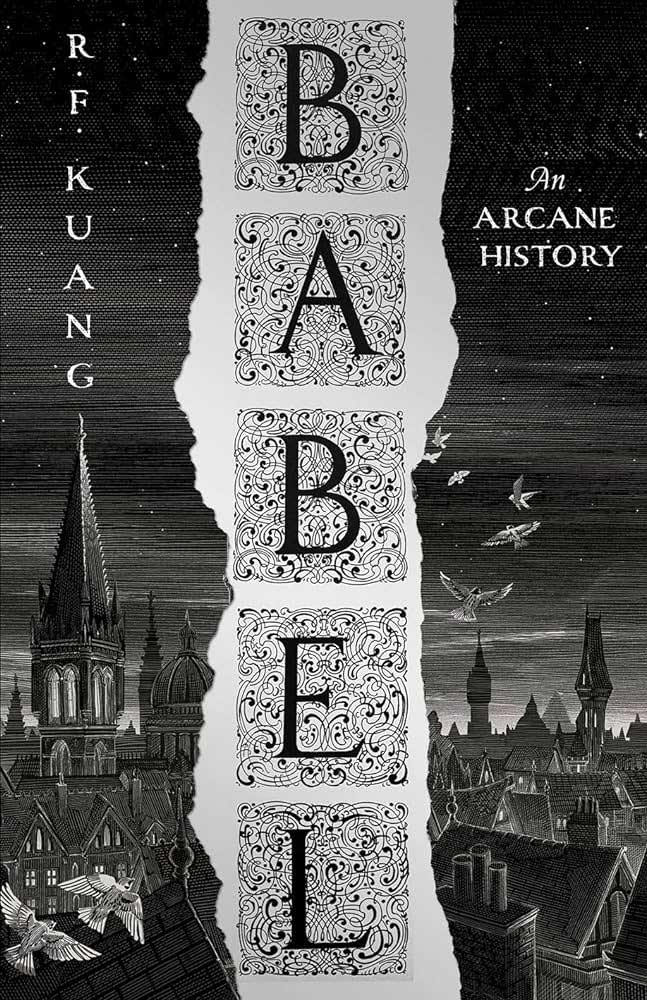R.F. Kuang’s comments Babel is a spellbinding novel that dives deep into the complexities of colonization, set against the backdrop of an alternate 19th-century Oxford. The story centers on a group of students at Babel, the prestigious Royal Institute of Translation. Kuang’s portrayal of the institution is both vivid and immersive, bringing to life the academic environment with all its grandeur and underlying tensions.
The novel’s characters are its heartbeat, and Kuang breathes life into them with remarkable depth. The protagonist, Robin Swift, is a young boy plucked from his native Canton and brought to England, where he is groomed for a life of scholarly pursuit. Robin’s journey is one of self-discovery and awakening, as he navigates the murky waters of identity, belonging, and resistance. His internal conflicts are portrayed with sensitivity, making his growth both compelling and relatable. Robin’s relationships with his fellow students—Ramiz, Letty, and Victoire—are fraught with the complexities of friendship, competition, and shared struggles against the oppressive forces that govern their world.

Kuang’s writing is a standout feature of Babel. Her prose is both elegant and evocative, with descriptions that paint vivid pictures in the reader’s mind. For instance, the depiction of Oxford on a foggy morning is so detailed that you can almost feel the dampness in the air and hear the distant tolling of church bells. Such imagery not only sets the scene but also enhances the atmospheric quality of the novel. Kuang’s ability to weave intricate details into her narrative makes the setting come alive, immersing readers in the world she has created.
The magical elements in Babel are seamlessly integrated into the story, enhancing the narrative without overshadowing the human experiences at its core. The novel’s use of silver-working—a form of magic that allows translators to harness the power of language—serves as a powerful metaphor for the ways in which knowledge and power are intertwined. This magical realism adds layers of meaning to the plot, making the fantastical elements feel grounded and believable. For example, the scenes where Robin and his friends engage in silver-working rituals are described with such precision and reverence that they feel almost ritualistic, highlighting the deep connection between language and power.
Central to Babel is its exploration of colonization. Kuang does not shy away from depicting the harsh realities of imperialism and its devastating impact on individuals and cultures. Through the lens of the protagonists, readers are invited to reflect on the enduring consequences of colonialism and the various forms of resistance against it. Robin’s internal struggle with his dual identity—caught between his native Cantonese heritage and his imposed English identity—mirrors the broader themes of cultural erasure and assimilation. The novel also critiques the ways in which language and knowledge are weaponized by colonial powers to maintain control and suppress dissent. This is poignantly illustrated in the scenes where the students at Babel confront the ethical implications of their work, realizing that their scholarly pursuits are inextricably linked to the machinery of empire.
What makes Babel truly engaging is its ability to blend the surreal with the believable. The magical elements are not just fantastical diversions but integral to the story’s exploration of power dynamics and cultural conflict. The use of magical realism allows Kuang to delve into themes of colonization and resistance in a way that feels both imaginative and deeply resonant. The novel’s climax, where the protagonists must confront the full extent of Babel’s complicity in the empire’s oppressive schemes, is both thrilling and thought-provoking, leaving readers questioning the true cost of knowledge and power.
Overall, Babel is a remarkable novel that combines historical fantasy with profound social commentary. Kuang’s ability to create a world that is both richly detailed and thematically deep makes for a reading experience that is both enchanting and enlightening. The novel’s exploration of colonization, identity, and resistance is both timely and timeless, offering insights that are as relevant today as they were in the 19th century. Kuang’s beautiful writing and vivid imagery, combined with her realistic character arcs and seamless integration of magical realism, make Babel a standout work of fiction. I give Babel 5 stars for its compelling narrative, beautifully crafted prose, and its poignant exploration of colonization and resistance. This is a book that stays with you long after the final page, prompting reflection on the themes it so skillfully explores.